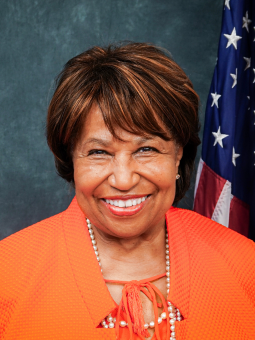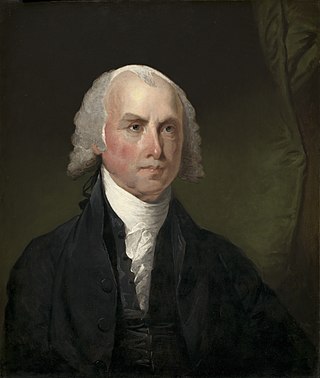Related Research Articles

The United States Congress is the legislative branch of the federal government of the United States. It is bicameral, composed of a lower body, the United States House of Representatives, and an upper body, the United States Senate. It meets in the United States Capitol in Washington, D.C. Members are chosen through direct election, though vacancies in the Senate may be filled by a governor's appointment. Congress has a total of 535 voting members, a figure which includes 100 senators and 435 representatives; the House of Representatives has 6 additional non-voting members. The vice president of the United States, as President of the Senate, has a vote in the Senate only when there is a tie.

In the United States, politics functions within a framework of a constitutional federal republic. The three distinct branches share powers: the U.S. Congress which forms the legislative branch, a bicameral legislative body comprising the House of Representatives and the Senate; the executive branch, which is headed by the president of the United States, who serves as the country's head of state and government; and the judicial branch, composed of the Supreme Court and lower federal courts, and which exercises judicial power.

The Australian Senate is the upper house of the bicameral Parliament of Australia, the lower house being the House of Representatives.

Carol Elizabeth Moseley Braun, also sometimes Moseley-Braun, is an American diplomat, politician, and lawyer who represented Illinois in the United States Senate from 1993 to 1999. Prior to her Senate tenure, Moseley Braun was a member of the Illinois House of Representatives from 1979 to 1988 and served as Cook County Recorder of Deeds from 1988 to 1992. She was elected to the U.S. Senate in 1992 after defeating Senator Alan J. Dixon in a Democratic primary. Moseley Braun served one term in the Senate and was defeated by Republican Peter Fitzgerald in 1998.

Blanche Kelso Bruce was an American politician who represented Mississippi as a Republican in the United States Senate from 1875 to 1881. Born into slavery in Prince Edward County, Virginia, he went on to become the first elected African-American senator to serve a full term.

The Connecticut Compromise, also known as the Great Compromise of 1787 or Sherman Compromise, was an agreement reached during the Constitutional Convention of 1787 that in part defined the legislative structure and representation each state would have under the United States Constitution. It retained the bicameral legislature as proposed by Roger Sherman, along with proportional representation of the states in the lower house or House of Representatives, and it required the upper house or Senate to be weighted equally among the states; each state would have two members in the Senate.
Reynolds v. Sims, 377 U.S. 533 (1964), was a landmark United States Supreme Court case in which the Court ruled that the electoral districts of state legislative chambers must be roughly equal in population. Along with Baker v. Carr (1962) and Wesberry v. Sanders (1964), it was part of a series of Warren Court cases that applied the principle of "one person, one vote" to U.S. legislative bodies.
How Democratic is the American Constitution? is a book by political scientist Robert A. Dahl that discusses seven "undemocratic" elements of the United States Constitution.

The United States Senate is the upper chamber of the United States Congress, which along with the United States House of Representatives—the lower chamber—comprises the legislative branch of the federal government of the United States. Like its counterpart, the Senate was established by the United States Constitution and convened for its first meeting on March 4, 1789 at Federal Hall in New York City. The history of the institution begins prior to that date, at the 1787 Constitutional Convention, in James Madison's Virginia Plan, which proposed a bicameral national legislature, and in the controversial Connecticut Compromise, a 5–4 vote that gave small-population states disproportionate power in the Senate.

Bruce Cumings is an American historian of East Asia, professor, lecturer and author. He is the Gustavus F. and Ann M. Swift Distinguished Service Professor in History, and the former chair of the history department at the University of Chicago. He formerly taught at Northwestern University and the University of Washington. He specializes in modern Korean history and contemporary international relations.

The voting rights of citizens in the District of Columbia differ from the rights of citizens in the 50 U.S. states. The United States Constitution grants each state voting representation in both houses of the United States Congress. It defines the federal district as being outside of any state and does not grant it any voting representation in Congress. The Constitution grants Congress exclusive jurisdiction over the District in "all cases whatsoever".

Federalist No. 62 is an essay written by James Madison as the sixty-second of The Federalist Papers, a series of essays initiated by Alexander Hamilton arguing for the ratification of the United States Constitution. It was first published in The New York Packet on February 27, 1788, under the pseudonym Publius. Federalist No. 62 is the first of two essays by Madison detailing, and seeking to justify, the organization of the United States Senate, and is titled "The Senate".

The United States House of Representatives, commonly known as the lower chamber of the United States Congress, along with the United States Senate, commonly known as the upper chamber, are the two parts of the legislative branch of the federal government of the United States. Like its counterpart, the House was established by the United States Constitution and convened for its first meeting on March 4, 1789, at Federal Hall in New York City. The history of this institution begins several years prior to that date, at the dawn of the American Revolutionary War.

Apportionment is the process by which seats in a legislative body are distributed among administrative divisions, such as states or parties, entitled to representation. This page presents the general principles and issues related to apportionment. The page apportionment by country describes the specific practices used around the world. The page Mathematics of apportionment describes mathematical formulations and properties of apportionment rules.

The Alabama State Senate is the upper house of the Alabama Legislature, the state legislature of the U.S. state of Alabama. The body is composed of 35 members representing an equal number of districts across the state, with each district containing at least 127,140 citizens. Similar to the lower house, the Alabama House of Representatives, the senate serves both without term limits and with a four-year term.
Richard Francis Fenno Jr. was an American political scientist known for his pioneering work on the U.S. Congress and its members. He was a Distinguished University Professor Emeritus at the University of Rochester. He published numerous books and scholarly articles focused on how members of Congress interacted with each other, with committees, and with constituents. Political scientists considered the research groundbreaking and startlingly original and gave him numerous awards. Many followed his research design on how to follow members from Washington back to their home districts. Fenno was best known for identifying the tendency — dubbed "Fenno's Paradox" — of how most voters say they dislike Congress as a whole, but they trust and reelect their local Congressman.

A More Perfect Constitution is a book published by American political scientist at the University of Virginia, Larry J. Sabato, in which he proposes a constitutional convention to substantially overhaul the United States Constitution. He points out that after the Bill of Rights, there have only been seventeen constitutional amendments over the past 220 years. He argues that a constitutional convention is overdue and is something that the Founding Fathers would have wanted. He offers 23 proposals for revising the Constitution.

The United States Senate is the upper chamber of the United States Congress. The Senate and the United States House of Representatives comprise the federal bicameral legislature of the United States. Together, the Senate and the House have the authority under Article One of the U.S. Constitution to pass or defeat federal legislation. The Senate has exclusive power to confirm U.S. presidential appointments to high offices, and approve or reject treaties, and try cases of impeachment brought by the House. The Senate and the House provide a check and balance on the powers of the executive and judicial branches of government.
Frances E. Lee, an American political scientist, is currently a professor of politics and public affairs at the Princeton School of Public and International Affairs at Princeton University. She previously taught at Case Western Reserve University and the University of Maryland, College Park. Lee specializes in American politics focusing on the U.S. Congress. From 2014 to 2019, Lee was co-editor of Legislative Studies Quarterly and is the first editor of Cambridge University Press's American Politics Elements Series. Her 2009 book Beyond Ideology has been cited over 600 times in the political science literature. Lee is also a co-author of the seminal textbook Congress and Its Members, currently in its eighteenth edition.
Kay Lehman Schlozman is an American political scientist, currently the J. Joseph Moakley Professor of Political Science at Boston College. Schlozman has made fundamental advancements to the study of participation in American politics, and was a pioneer in the field of gender and politics. Her contributions include the theory of civic voluntarism, several landmark studies on the relationship between access to resources and different types of political participation, and related investigations into the nature of civic culture. Schlozman has one of the highest citation counts of any political scientist, including being among the top 50 most cited active political scientists and top 10 most cited women in the discipline. She worked closely with Sidney Verba for nearly 50 years, first as his student and then as his collaborator.
References
- ↑ Blue, Jalen (22 January 2019). "Olympics and Judaism subject of Sports and Society event with political scientist Bruce Oppenheimer Jan. 31". Vanderbilt University. Retrieved February 4, 2019.
- ↑ "Google Scholar". scholar.google.com. Retrieved February 4, 2019.
- ↑ Bailey, Michael (June 2002). "Sizing Up the Senate: The Unequal Consequences of Equal Representation. By Frances E. Lee and Bruce I. Oppenheimer. Chicago: University of Chicago Press, 1999. 304p. 17.00 paper". American Political Science Review. 96 (2): 427–428. doi:10.1017/S0003055402530240. ISSN 1537-5943. S2CID 145756095.
- ↑ Harris, Fred R. (September 2000). "Sizing Up the Senate: The Unequal Consequences of Equal Representation by Francis E. Lee and Bruce I". Political Science Quarterly. 115 (3): 489–490. doi:10.2307/2658156. JSTOR 2658156.
- ↑ Lazare, Daniel (September 25, 2000). "Review: Sizing Up the Senate: The Unequal Consequences of Equal Representation". The American Prospect . 11 (21): 77.
- ↑ Brownstein, Analysis by Ronald (July 10, 2018). "Small states are getting a much bigger say in who gets on Supreme Court". CNN. Retrieved February 4, 2019.
- ↑ Christopher Ingraham (2021-11-24) [2018-06-27]. "The case against civility, in five charts". The Washington Post . Washington, D.C. ISSN 0190-8286. OCLC 1330888409.[ please check these dates ]